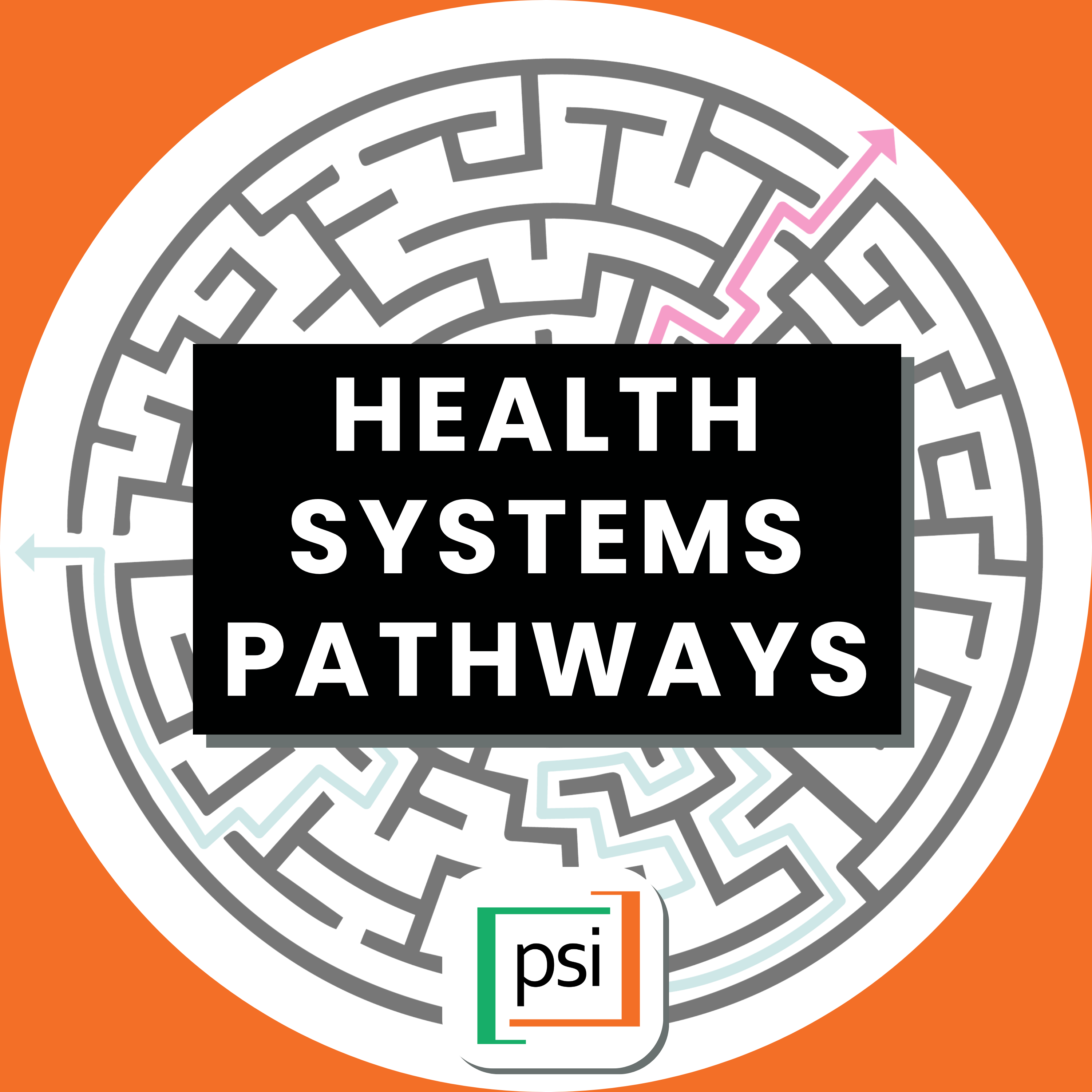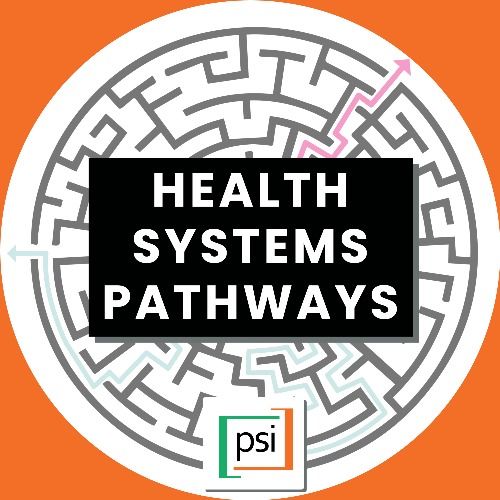Episode 6
Strengthening Health Governance: Tools and Strategies
Governance is the backbone of effective health systems. Recorded live at HSR2024 in Nagasaki, this episode examines how governance tools and strategies can shape stronger, more equitable mixed health systems in low- and middle-income countries.
Catherine Goodman, from the London School of Hygiene and Tropical Medicine, shares findings from a WHO commissioned review on private sector governance. She highlights the need for governments to establish clear visions, integrate governance mechanisms, and address capacity gaps when working with private sector actors.
David Clarke from WHO introduces the Progression Pathway tool, a flexible framework that guides countries in assessing and strengthening their governance. He shares insights from its use in diverse contexts, including Ghana, Oman, and Georgia, and discusses how it fosters collaboration across public and private sectors.
This conversation provides practical guidance for policymakers, health professionals, and stakeholders working to improve governance.
Key takeaways from Catherine Goodman and David Clarke on building effective, flexible governance frameworks for mixed health systems.
Useful links;
- WHO: Governance of the Private Health Sector | BMJ Global Health
- The Progression Pathway for Governance of Mixed Health Systems | Country Connector
For more information;
HSS Insights Series: PSI - To access Population Service International's blogs and policy briefs, visit our health systems insights website.
Health Systems Pathways is an SCL Agency Production
Transcript
Hi everyone, welcome back to Health Systems Pathways.
Alex Ergo:This podcast shares insights to inform, inspire, and spark discussions about making health systems easier to navigate in low and middle-income countries.
Alex Ergo:I'm Alex Ergo, PSI's Director of Health Systems, and I'm really excited to bring you another special episode recorded live at the Health Systems Research Symposium in Nagasaki.
Alex Ergo:In today's episode, we focus on governance in mixed health systems, an area that's essential for ensuring health systems work for everyone.
Alex Ergo:First, we'll hear from Catherine Goodman, who shares findings from a scoping review on governance in the private health sector.
Alex Ergo:Her research highlights the need for clear government vision and better integration of governance tools.
Alex Ergo:Then David Clarke from WHO introduces the progression pathway tool, which is helping countries improve governance step by step.
Alex Ergo:So, let's dive right into these fascinating conversations.
Alex Ergo:Hi, everyone.
Alex Ergo:I'm now with Catherine Goodman.
Alex Ergo:Very nice to have you with us.
Alex Ergo:Would you mind just briefly introducing yourself?
Catherine Goodman:Yeah, great to be here, Alex.
Catherine Goodman:So I'm Catherine Goodman, and I'm a professor.
Catherine Goodman:I do health economics and health systems research, and I'm based at the London School of Hygiene and Tropical Medicine.
Alex Ergo:Yeah, thank you.
Alex Ergo:And this morning you presented on a paper that was just issued on the governance of the private health care sector in low and middle-income countries.
Alex Ergo:And there was a scoping review.
Alex Ergo:Would you mind saying a few words about that?
Catherine Goodman:Yeah, sure.
Catherine Goodman:So this is a review that was commissioned by WHO and they were keen to really understand the evidence base on governance of the private health sector in low and middle-income countries.
Catherine Goodman:So we were charged with trying to search for and synthesize the published and grey literature in that area.
Alex Ergo:And what were the main findings?
Catherine Goodman:Well, there are a lot of findings across many different areas, stretching from regulation to purchasing to stakeholder engagement and data.
Catherine Goodman:But I think probably easier if I jump to some of the take home messages across all of that.
Catherine Goodman:I think one of them was that when you're involved in governance, you really need to start with a clear vision of where you want to end up.
Catherine Goodman:If the government doesn't have a clear vision of that, the private sector will have many of their own visions, which they may impose through their own activities, and it may not lead you to the UHC destination you want to go to.
Catherine Goodman:So, the government needs to start with a very clear vision of what it would like the private sector's role to be.
Catherine Goodman:I think another real message that came from the review was the importance of exploiting synergies between different governance mechanisms.
Catherine Goodman:So, for instance, we may think of regulatory mechanisms or contracting mechanisms or data system mechanisms, but it's really important to make them work together.
Catherine Goodman:So, for example, thinking about making empanelment into a contracting mechanism contingent on compliance with a regulatory mechanism or making licensing contingent on compliance with reporting your data.
Catherine Goodman:So really thinking of these different mechanisms as part of one system interacting with each other.
Catherine Goodman:One finding, I think, which did surprise us a bit was how much governance is done at a devolved level within health systems.
Catherine Goodman:So you've got governance at a national level, but in many countries, their devolution to states or counties is really important in health care.
Catherine Goodman:And so, it's a real challenge at that level to undertake the governance function, and you often find real gaps in capacity there.
Catherine Goodman:There having said that capacity can be a problem throughout the whole health system.
Catherine Goodman:And we really saw that in terms of the skills that you need to govern.
Catherine Goodman:A lot of people who work in ministries of health have always worked in the public sector.
Catherine Goodman:They're not necessarily used to dealing with private sector commercial entities, and they don't have the skills needed to, say, think about designing good contracts and incentivizing appropriate behavior.
Catherine Goodman:So we really need to work out how to address some of those capacity gaps.
Alex Ergo:And did the scoping mission also come up with recommendations?
Catherine Goodman:Well, I guess the scoping review was designed to support WHO's work in developing a progression pathway for the governance of mixed health systems.
Catherine Goodman:So WHO have designed this document which helps countries assess themselves on how they're doing on their governance, governance activities, and assess themselves under different categories of how well they're performing from a sort of nascent level up to a really strong level in different areas.
Catherine Goodman:So this review was designed to inform that and help them design that progression pathway.
Alex Ergo:That's great.
Alex Ergo:And that's the work that's being led by WHO Dave Clarke's team, right?
Catherine Goodman:So, they're working with countries at the moment to try that out and see how it can support them in really strengthening their governance mechanisms.
Alex Ergo:I think we'll have a chance to talk to Dave as well, so thank you so much for sharing that.
Alex Ergo:Was there anything else you thought would be worth sharing with the audience?
Catherine Goodman:I guess one thing we've been talking a lot about is a fine balance that every government has to try and tread when working with the private sector.
Catherine Goodman:On the one hand, you want to really build trusting relationships and partnerships and listen to the private sector and understand their needs, their constraints.
Catherine Goodman:But at the same time, you've got to be constantly guarding against undue influence by private sector actors over the direction of government policy and really trying to make sure you have systems in place that avoid conflicts of interest.
Catherine Goodman:And I think that is one of the hardest challenges as government operators in this area to try and keep both of those things in mind.
Alex Ergo:That is indeed a great challenge that I've seen myself in several countries.
Alex Ergo:So yes, thank you so much for sharing that and thank you for joining this podcast.
Alex Ergo:So we just heard from Catherine Goodman about the scoping review that she conducted and a nice follow on now is our new guest, David Clarke.
Alex Ergo:So David, would you like to introduce yourself first?
David Clarke:Hi Alex, I'm David Clarke.
David Clarke:I work at WHO headquarters in Geneva and one of the topics I work on is private sector engagement.
Alex Ergo:As I understand, you've been basically building on this work that Catherine described to build this progression pathway.
Alex Ergo:Could you say a few words about what exactly that is?
David Clarke:So we commissioned Catherine and her colleagues to carry out the scoping review for us to help us to put the progression pathway together.
David Clarke:So the progression pathway is, I guess, it's a maturity model for looking at how governance can be built over time in countries.
David Clarke:The idea behind it came from our expert advisory group on the private sector, who told us that we needed to do more to explain in a very granular way to countries what they needed to do to strengthen their governance.
David Clarke:That both, both their governance norms, but also their institutional arrangements and the idea behind the progression pathway is that the strengthening process isn't a one off process.
David Clarke:It is a continuum where we want to ask governments to look at how they can strengthen their governance over time and as part of a continuing strengthening process.
David Clarke:The idea behind the progression pathway is that, of course, we can't come up with a standard guide for all country contexts.
David Clarke:So instead, we decided it was best to provide a framework which allowed countries to make their own decisions about how they wanted to govern.
Alex Ergo:Has the progression pathway already been tested in some countries or what's the status right now?
David Clarke:Yes.
David Clarke:So we, we pretty, pretty much started working with countries in March.
David Clarke:So we've worked in Egypt and Oman in the Emirate region.
David Clarke:We've worked in Georgia in our European region.
David Clarke:We've worked with Ghana in our African region.
David Clarke:And we're about to work with Ethiopia, uh, Syria and Somalia and Tunisia.
Alex Ergo:And any insights from this work?
David Clarke:Yes.
David Clarke:There's a couple of things I wanted to highlight.
David Clarke:All of these countries have used the progression pathway in a different way.
David Clarke:They've chosen different entry points which was really great.
David Clarke:We designed this document and this approach to be fully flexible.
David Clarke:So we're very happy that countries have made their own decisions about how to use it.
David Clarke:They've all come to very different conclusions about how they want to take this work forward.
David Clarke:And they've all describe for us, both the Ministry of Health colleagues and also people from our country offices, how useful they find it.
David Clarke:They find it a very practical tool.
David Clarke:They've also told us that it seems to cover off all of the key issues that they'd expect to have to think about when it comes to this topic.
David Clarke:So we're very gratified that it seems to be well received and working well.
Alex Ergo:And what's next now?
Alex Ergo:So, it's being tested in a number of countries.
Alex Ergo:So, what's the next step?
David Clarke:Well, the next step, I think, is to complete some more testing.
David Clarke:And then, once we have a critical mass of countries who've undertaken this first round of work, we're going to convene a meeting of all the countries, both, both the consultants who are involved and also the Ministry of Health people, to get some feedback from them on what we can do to improve the document.
David Clarke:It's a document which we recognize we're going to have to continue to improve over time, taking into account country experiences with it but I think we already have some ideas about what we need to do to support countries further with this work.
Alex Ergo:And initial reactions from Ministry of Health people?
David Clarke:They're all really delighted by it.
David Clarke:They find the concepts very familiar, they find the way it's put together very logical, and they find it very helpful for their interactions with their stakeholders in their countries.
David Clarke:So what we are doing in each country is bringing together, under the guidance of the Ministry of Health, stakeholders from both the private and the public sector, and we're getting good feedback from all of these stakeholders about how useful the document is and how comprehensive the framework is.
Alex Ergo:And does this convening that's happening at country level also involve the voice of the individuals, the beneficiaries, the patients?
David Clarke:Yes, there are consumers involved in these discussions.
David Clarke:I think we need to look at how this has been done.
David Clarke:All the countries are doing the different way.
David Clarke:So some of them are bringing in consumer representatives, some of them bringing in consumer organizations, but we always thought that this process should involve the end user, the people who need to be benefiting from our efforts to work with the private sector.
Alex Ergo:And when you say private sector, what kind of representation from the private sector do you see in the countries when, when those convenings happen?
David Clarke:Okay, so just to clarify, when we talk about the private sector, we're talking about all of the non-state actors who aren't part of the government.
David Clarke:So, we'll have the not for profit private sector, but also the for profit private sector.
David Clarke:And it really depends on the country context which private sector is, is heavily engaged.
David Clarke:So for example, we're doing work in Ghana at the moment, and a lot of the efforts that the Ghana Ministry of Health are undertaking a focus on the not for profit private sector, because of course they've long had this relationship with faith based providers in Ghana, whereas in some other countries, so for example, we're doing work in in Georgia.
David Clarke:The focus is more on the for profit private sector and on hospitals.
David Clarke:This is the beauty of this document and the approach is it can be used in a variety of contexts with a variety of different private sector actors.
Alex Ergo:And are there examples of countries where these private sector representatives also includes, for example, private pharmacies or GP clinics or even informal drug vendors?
David Clarke:Um, not yet.
David Clarke:No, none of the countries that we've worked with yet have focused on those issues, but of course, I'm sure some of them will.
David Clarke:We've designed the document in the way which allows but we've really left it to the countries to decide what the entry point should be for this work.
Alex Ergo:And that's great.
Alex Ergo:So thank you for sharing that.
Alex Ergo:A last question, you had the session this morning.
Alex Ergo:What was the key takeaway from the session or any surprise that you heard there?
David Clarke:I think that we got really g reat feedback about the utility of the document, which is, of course, a huge relief.
David Clarke:We had some really experienced health systems people in the room, so it was great to have their endorsement of this.
David Clarke:Uh, they also came up with some really great ideas about how we can support countries to undertake the ranking process that's part of the progression pathway, because the progression pathway has countries look at where they sit on a continuum of capacities, so there was some really great feedback about how we could do that, and there was also some really great feedback about how we could enhance the process, maybe by developing some tools that could be used for the process, such as patient pathway analysis.
David Clarke:Also there was some great discussions about whether or not we could come up with some tools for implementation of the decisions that could be made using the process.
David Clarke:So, we have lots of takeaways and lots of, lots of work to do.
Alex Ergo:Great insights from Catherine Goodman and David Clarke.
Alex Ergo:Catherine outlined the importance of a strong, clear vision and coordinated governance mechanisms, while David shared how the progression pathway is already helping countries strengthen governance in practical and flexible ways.
Alex Ergo:Thank you for tuning into Health Systems Pathways.
Alex Ergo:If you enjoyed this episode, don't forget to subscribe or follow us wherever you get your podcasts.
Alex Ergo:We'll bring you more fresh insights straight from the halls of the HSR symposium in Nagasaki very soon.
Alex Ergo:Until next time, I'm Alex Ergo.
Alex Ergo:Let's keep working together to build stronger health systems that work for people.




